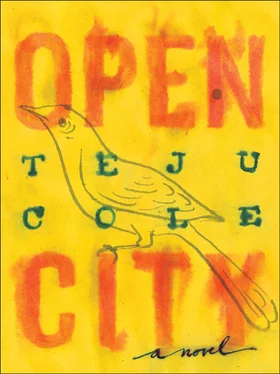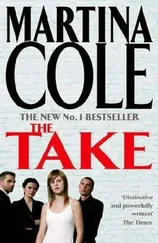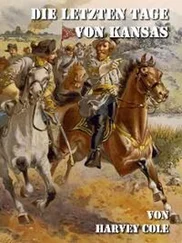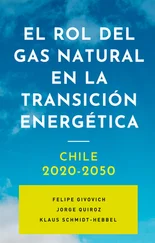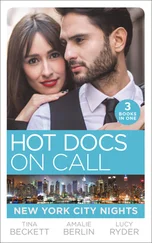I have two projects, Farouq said. There is the practical one, and there’s a deeper one. I asked if the practical one was his job at the shop. No, he said, not even that; the practical thing, for the long term, is my studies. I’m studying to be a translator between Arabic, English, and French, and I’m also doing some courses in media translation and subtitles for films, this kind of thing. That’s how I will find a job. But my deeper project is about what I said last time, the difference thing. I strongly believe this, that people can live together, and I want to understand how that can happen. It happens here, on this small scale, in this shop, and I want to understand how it can happen on a bigger scale. But as I told you, I’m an autodidact, so I don’t know what form this other project will take.
I asked him if he thought he could be a writer, and he said that even that was unclear to him. He would study first, he said, and come to an understanding, and only then decide what form his action would take. I was struck by the purity of the goal, its idealism and old-fashioned radicalism, and the certainty in the way he expressed it, as though it was something he had nurtured for many years; and I trusted it, in spite of myself. But I also thought about his reference to our previous conversation, when he said he had referred to himself as an autodidact. It was a minor thing, of course, but (and I was sure I wasn’t misremembering) he had only used the word in reference to Mohamed Choukri, not to himself. This was a small instance, not of unreliability, but of a certain imperfection in Farouq’s recall which, because of the absolute sureness of his manner, it was easy to miss. It in any case made me revise my previous impression of his sharpness, even if only modestly. These minor lapses — there were others, and they were irrelevant lapses, actually, not even worthy of the label mistake —made me feel less intimidated by him.
My experience at the American school, Farouq said, became combined in my mind with Fukuyama’s idea of the end of history. It is impossible, and it is arrogant, to think that the present reality of Western countries is the culminating point of human history. The principal had been talking in all these terms — melting pot, salad bowl, multiculturalism — but I reject all these terms. I believe foremost in difference. Remember what I said about Malcolm X: this is what the Americans don’t understand, that the Iraqis can never be happy with foreign rule. Even if Egypt invaded Palestine to save them from Israel, the Palestinians cannot accept this, they would not want Egyptian rule. No one likes foreign domination. Do you know how much Algeria and Morocco hate each other? So you can imagine how bad it is when it is a Western power doing the invasion. I believe that Benjamin can help me understand this better, and I believe that his subtle revisions of Marx can help me understand the historical structure that makes difference possible. But I believe, also, in the divine principle. There are those things that Islam can offer our thinking. Do you know Averroës? Not all Western thought comes from the West alone. Islam is not a religion; it is a way of life that has something to offer to our political system. I say all this not to make myself the representative of Islam. Actually, I am a bad Muslim, you see, but one day I will return to my practice. At the moment I don’t practice very well.
He paused, and laughed, assessing my reaction to what he had been saying. I gave no indication of my thoughts. I only nodded, signaling that I was listening. Three or four customers had gathered around the desk and, with a smile, Farouq continued. The thing, though, is that I am a pacifist. I don’t believe in violent compulsion. You know, even if someone is right here, with a gun pointed at my family, I cannot kill this person. I mean it, so don’t look so surprised. But, my friend, he said, in a tone that indicated he was wrapping things up, let us meet the day after tomorrow. You’re a man of philosophy, but you’re an American also, and I want to talk to you more about some things. On Saturday, I get off work at six. Why don’t you meet me across the street? That Portuguese place, Casa Botelho, right at that corner here — he pointed across the street — let us meet there on Saturday evening.
ON SATURDAY, I WENT UP THE STEEP HILL OF THE CHAUSSÉE d’Ixelles all the way to Porte de Namur, and from there I cut across the throng of weekend shoppers to Avenue Louise, and then on to the Royal Palace. Every now and again, looking into the faces of the women huddled at the tram stops, I imagined that one of them might be my oma. It was a possibility that had come to me each time I was out in the city, that I might see her, that I might be tracing paths she had followed for years, that she might indeed be one of the old women with their orthopedic shoes and crinkly shopping bags, wondering from time to time how her only daughter’s only son was doing. But I could recognize the nostalgic wish-fulfillment fantasy at work. I had almost nothing to go on, and my search, if my poor effort could be called by that term, became insubstantial and expressed itself only as the faint memory of the day she had visited Olumo Rock with us in Nigeria, and had wordlessly massaged my shoulder. It was in these thoughts that I began to wonder if Brussels hadn’t somehow drawn me to itself for reasons more opaque than I suspected, that the paths I mindlessly followed through the city followed a logic irrelevant to my family history.
The weather had become drizzly again, but as a fine mist, not rain. I had not taken an umbrella, so I went to the Musées Royaux des Beaux-Arts, but once I was inside, I found that I was not at all in the mood to look at paintings. I stepped outside again, into the mist. From then on, I simply wandered aimlessly, through the Egmont Park and its morose gallery of bronze statues, then down to Grand Sablon, with its antiques dealers who hovered with suspicious glances over their worthless old coins, past the little café I’d visited before, having a quick glance in to see if my tall waitress was there (she wasn’t), and from there down to Place de la Chapelle. The cathedral there was like the streaked hull of a sunken ship, and the few people around it were tiny and drab, like midges. The sky, already gloomy, had quickly begun to darken. There was an Indian restaurant I had seen in the area once, and I thought I should find it and eat there. When I had walked by before, I had noticed a menu board that included Goan fish curry, and I started craving that dish; but I simply ended up lost, tramping around in an area of derelict government housing in which not a single wall was free of graffiti. My wool coat was sodden by this time. Because there was no metro in the immediate vicinity, I walked back to Porte de Namur and took a bus from there down to Philippe. I hurried to my apartment and changed out of the soaked coat, then went out immediately again to meet Farouq at Casa Botelho.
Three men sat playing cards in a corner of the café. Their dowdy clothes, the slow deliberation of their movements, and the clutter of bottles on the table cumulatively created an exact Cézannesque tableau. It was accurate even down to the detail of one man’s thick mustache, which I could swear I had already seen on a canvas at the Museum of Modern Art. The room was busy, but as I came in I saw Farouq at a table farther inside, near the window. He raised a hand, and smiled. There was a man sitting there with him and, as I approached, they both stood up. Julius, Farouq said, I want you to meet Khalil. He’s one of my friends, in fact I can say he’s my best friend. Khalil, this is Julius: he is more than a customer. I shook hands with them and we sat. They were already drinking — both of them had bottles of Chimay beer — and were also smoking. Behind Khalil, and just visible in the nicotine haze, was a sign warning that smoking was not permitted in the restaurant. It was a new law; it had come into effect just a few days before, with the new year, and no one, neither management nor customers, seemed to have any interest in enforcing it. The waitress, with whom they both appeared to be familiar, came to take my order. She speaks English, Khalil said in English, but I don’t. We laughed, but it was true: that was the most fluent English he would speak to me. I ordered a Chimay.
Читать дальше
